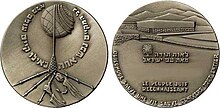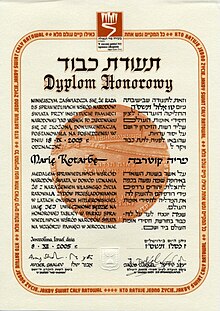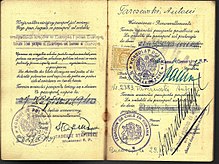Righteous Among the Nations
| Righteous Among the Nations |
|---|
 |
| By country |
Righteous Among the Nations (Hebrew: חֲסִידֵי אֻמּוֹת הָעוֹלָם ḥasidei ummot ha'olam) is a title used by Yad Vashem to describe people who, for various reasons, made an effort to assist victims, including Jews, who were being exterminated by Nazi Germany during the Holocaust. The term originates from the concept of ger toshav, a legal term used to refer to non-Jewish observers of the Seven Laws of Noah.
Endowment
[edit]Criteria of the Knesset
[edit]When Yad Vashem, the Shoah Martyrs' and Heroes' Remembrance Authority, was established in 1953 by the Knesset, one of its tasks was to commemorate the "Righteous Among the Nations". The Righteous were defined as non-Jews who risked their lives to save Jews during the Holocaust.
Since 1963, a commission headed by a justice of the Supreme Court of Israel has been charged with the duty of awarding the honorary title "Righteous Among the Nations". Guided in its work by certain criteria, the commission meticulously studies all documentation including evidence by survivors and other eyewitnesses, evaluates the historical circumstances and the element of risk to the rescuer, and then decides if the case meets the criteria. Those criteria are:[1]
- Only a Jewish party can put forward a nomination
- Helping a family member or helping a Jew who converted to Christianity is not ground for recognition;
- Assistance has to be repeated or substantial
- Assistance has to be given without any financial gain expected in return (although covering expenses such as food is acceptable)
The award has been given without regard to the social rank of the helper. It has been given to royalty such as Princess Alice of Battenberg, Queen Mother Helen of Romania and Queen Elisabeth of Belgium but also to others like the philosopher Jacques Ellul, Salvadoran diplomat José Castellanos Contreras and to Amsterdam department store employee Hendrika Gerritsen.[2][3]
Reception in Jerusalem
[edit]

A person who is recognized as Righteous for having taken risks to help Jews during the Holocaust is awarded a medal in their name, a certificate of honor, and the privilege of having the name added to those on the Wall of Honor in the Garden of the Righteous at Yad Vashem in Jerusalem (the last is in lieu of a tree planting, which was discontinued for lack of space). The awards are distributed to the rescuers or their next of kin during ceremonies in Israel, or in their countries of residence through the offices of Israel's diplomatic representatives. These ceremonies are attended by local government representatives and are given wide media coverage.[citation needed]
Israeli citizenship and legal benefits
[edit]The Yad Vashem Law authorizes Yad Vashem "to confer honorary citizenship upon the Righteous Among the Nations, and if they have died, the commemorative citizenship of the State of Israel, in recognition of their actions". Anyone who has been recognized as "Righteous" is entitled to apply to Yad Vashem for the certificate. If the person is no longer alive, their next of kin is entitled to request that commemorative citizenship be conferred on the Righteous who has died.[4]

In total, 28,217 (as of 1 January 2022[update])[5] men and women from 51 countries have been recognized,[5] amounting to more than 10,000 authenticated rescue stories. Yad Vashem's policy is to pursue the program for as long as petitions for this title are received and are supported by evidence that meets the criteria.[6]
Recipients who choose to live in the State of Israel are entitled to a pension equal to the average national wage and free health care, as well as assistance with housing and nursing care.[citation needed]
Recipients settled in Israel
[edit]At least 130 Righteous non-Jews have settled in Israel. They were welcomed by Israeli authorities, and were granted citizenship. In the mid-1980s, they became entitled to special pensions. Some of them settled in British Mandatory Palestine before Israel's establishment shortly after World War II, or in the early years of Israel, while others came later. Those who came earlier often spoke fluent Hebrew and have integrated into Israeli society.[7] Children and grandchildren of Righteous Gentiles are entitled to a temporary residence visa in Israel, but not Israeli citizenship.[8]
Non-Jewish initiatives for the Righteous
[edit]
Christian honours
[edit]One Righteous Among the Nations, Saint Elizabeth Hesselblad of Sweden, has been canonized a saint in the Catholic Church.[9] Seven others have been beatified: Giuseppe Girotti and Odoardo Focherini of Italy,[10][11] Klymentiy Sheptytsky of Ukraine,[12] Bernhard Lichtenberg of Germany,[13] Sára Salkaházi of Hungary, and Józef and Wiktoria Ulma of Poland (together with their children).
Maria Skobtsova of Paris and her companions are recognised as martyrs in the Eastern Orthodox Church. Her feast day is 20 July.
The Irish Catholic priest Hugh O'Flaherty, a senior official of the Roman Curia and a significant figure in the Catholic resistance to Nazism, was responsible for saving 6,500 Jews during the Second World War, more lives than Oskar Schindler yet he has not been awarded the honour of Righteous Among the Nations. O'Flaherty's ability to evade the traps set by the German Gestapo and Sicherheitsdienst (SD) earned him the nickname "The Scarlet Pimpernel of the Vatican".[14]
Secular honours
[edit]


In 2015, Lithuania's first street sign honoring a Righteous Among the Nations was unveiled in Vilnius.[15] The street is named Onos Šimaitės gatvė, after Ona Šimaitė, a Vilnius University librarian who helped and rescued Jewish people in the Vilna Ghetto.[15]
In Zvolen, Slovakia, the Park of Generous Souls commemorates the Righteous Among the Nations from Slovakia.[16]
Beginning in 2018, China's most significant World War II museum, the War of Resistance Museum, features China's Righteous Among the Nations and other Chinese figures who helped Jews escape Europe.[17]
Number of awards by country
[edit]As of 10 August 2023[update], the award has been made to 28,217 people. Yad Vashem emphasises that the table is not representative of the effort or proportion of Jews saved per country, and notes that these numbers "are not necessarily an indication of the actual number of rescuers in each country, but reflect the cases that were made available to Yad Vashem."[5]
See also
[edit]- British Hero of the Holocaust
- Called by Name
- European Day of the Righteous
- Individuals and groups assisting Jews during the Holocaust
- List of Righteous Among the Nations by country
- Righteousness
- Virtuous pagan
- Żegota
Notes
[edit]- ^ While the title of Righteous is awarded to individuals, not groups, the Danish resistance viewed the Rescue of the Danish Jews as a collective act, and asked Yad Vashem not to recognize resistance members individually. Yad Vashem respected the request, and hence the number of Danish Righteous is relatively small.
References
[edit]- ^ Paulsson, Gunnar S. (June 1998). "The Rescue of Jews by Non-Jews in Nazi-Occupied Poland". The Journal of Holocaust Education. 7 (1–2): 19–44. doi:10.1080/17504902.1998.11087056.
- ^ "Gerritsen, Hendrika Jacoba (Heinsius)". The Righteous Among the Nations. Jerusalem: Yad Vashem. Archived from the original on 7 April 2018. Retrieved 6 April 2018.
- ^ "Familieberichten" [Family notices]. Het Parool. 28 December 1990. Archived from the original on 28 September 2023. Retrieved 13 April 2018 – via Delpher.
- ^ Honoring the Righteous
- ^ a b c "About the Righteous: Statistics". Names of Righteous by Country. Yad Vashem The Holocaust Martyrs' and Heroes' Remembrance Authority. 1 January 2022. Retrieved 6 April 2024.
- ^ "First Arab Nominated for Holocaust Honor". Associated Press. 30 January 2007. Archived from the original on 8 July 2011. Retrieved 1 February 2007.
- ^ Jeffay, Nathan (6 October 2011). "'Righteous' Moved to Israel After Saving Jews in Holocaust". The Forward. Archived from the original on 24 April 2014. Retrieved 6 September 2013.
- ^ "Righteous Among the Nations Visa \ Residence permit in Israel". 6 October 2011. Archived from the original on 24 April 2014. Retrieved 3 July 2021.
- ^ Greaves, Mark (18 December 2015). "Swedish Sister who hid Jews from the Nazis is to be canonised". Catholic Herald. Archived from the original on 9 December 2019. Retrieved 19 December 2015.
- ^ "Blessed Giuseppe Girotti: Another Dominican Saint in the Making". Order of Preachers. Archived from the original on 28 December 2016. Retrieved 21 December 2016.
- ^ "Odoardo Focherini: Late journalist, hero and Blessed of the Catholic Church". Rome Reports. Archived from the original on 7 November 2021. Retrieved 19 June 2013.
- ^ "Beatification of the Servants of God on June 27, 2001". Ukrainian Greek Catholic Church. Archived from the original on 29 November 2014.
- ^ Gaydosh, Brenda (2017). Bernhard Lichtenberg. Roman Catholic Priest and Martyr of the Nazi Regime. Lanham, MD: Lexington Books. p. 175. ISBN 978-1-4985-5311-7.
- ^ Rosen, Robyn (17 March 2011). "Tribute to the Irish Scarlet Pimpernel". The Jewish Chronicle. Retrieved 7 September 2017.
- ^ a b "Lithuania's first street honoring Holocaust Righteous unveiled in Vilnius". Jewish Telegraphic Agency. 25 September 2015. Archived from the original on 26 September 2015. Retrieved 26 September 2015.
- ^ Nižňanský, Eduard (2014). "On Relations between the Slovak Majority and Jewish Minority During World War II". Yad Vashem Studies. 42 (2): 89. ISSN 0084-3296.
- ^ Mitter, Rana (2020). China's good war : how World War II is shaping a new nationalism. Cambridge, Massachusetts: The Belknap Press of Harvard University Press. pp. 120–121. ISBN 978-0-674-98426-4. OCLC 1141442704. Archived from the original on 2 April 2023. Retrieved 18 October 2022.
- ^ Geiger, Vladimir (2012). "Human losses of Croats in World War II and the immediate post-war period caused by the Chetniks (Yugoslav Army in the Fatherland) and the Partisans (People's Liberation Army and the partisan detachment of Yugoslavia/Yugoslav Army) and the Yugoslav Communist authoritities. Numerical indicators". Review of Croatian History. 8 (1). Croatian institute of history: 77–121. Archived from the original on 17 November 2015. Retrieved 16 August 2023.
Bibliography
[edit]- The Heart Has Reasons: Holocaust Rescuers and Their Stories of Courage, Mark Klempner, ISBN 0-8298-1699-2, The Pilgrim Press.
- Righteous Gentiles of the Holocaust: Genocide and Moral Obligation, David P. Gushee, ISBN 1-55778-821-9, Paragon House Publishers.
- The Lexicon of the Righteous Among the Nations, Yad Vashem, Jerusalem. (volumes: Poland, France, Netherlands, Belgium, Europe I, Europe II).
- To Save a Life: Stories of Holocaust Rescue, Land-Weber, Ellen, ISBN 0-252-02515-6, University of Illinois Press.
- The Seven Laws of Noah, Lichtenstein, Aaron, New York: The Rabbi Jacob Joseph School Press, 1981, ASIN B00071QH6S.
- The Image of the Non-Jew in Judaism, Novak, David, ISBN 0-88946-975-X, Lewiston, New York: Edwin Mellen Press, 1983.
- The Path of the Righteous: Gentile Rescuers of Jews During the Holocaust, Paldiel, Mordecai, ISBN 0-88125-376-6, KTAV Publishing House, Inc.
- Among the Righteous: Lost Stories from the Holocaust's Long Reach into Arab Lands, Robert Satloff, Washington Institute for Near East Policy, (PublicAffairs, 2006) ISBN 1-58648-399-4.
- When Light Pierced the Darkness: Christian Rescue of Jews in Nazi-Occupied Poland, Tec, Nechama, ISBN 0-19-505194-7, Oxford University Press.
- Zegota: The Council to Aid Jews in Occupied Poland 1942-1945, Tomaszewski, Irene & Werbowski, Tecia, ISBN 1-896881-15-7, Price-Patterson.
- Tolerance in Judaism: The Medieval and Modern Sources, Zuesse, Evan M., In: The Encyclopaedia of Judaism, edited by Jacob Neusner, A. Avery-Peck, and W.S. Green, Second Edition, ISBN 90-04-14787-X, Leiden: Brill Publishers, 2005, Vol. IV: 2688–2713.
- When Courage Was Stronger Than Fear: Remarkable Stories of Christians Who Saved Jews from the Holocaust by Peter Hellman. 2nd edition, ISBN 1-56924-663-7, Marlowe & Companym, 1999.
- Rescue and Flight: American Relief Workers Who Defied the Nazis, Subak, Susan Elisabeth, University of Nebraska Press, 342 pp., 2010.
- Ugo G. Pacifici Noja e Silvia Pacifici Noja, Il cacciatore di giusti: storie di non ebrei che salvarono i figli di Israele dalla Shoah, Cantalupa Torinese, Effatà, 2010, (in Italian), ISBN 978-88-7402-568-8.
- Paul Greveillac, Les fronts clandestins : quinze histoires de Justes (in French), Nicolas Eybalin publishing, 2014 (ISBN 978-2-36665-000-6).
External links
[edit]This article's use of external links may not follow Wikipedia's policies or guidelines. (June 2023) |
- The Righteous Among the Nations at Yad Vashem. Its online exhibitions include:
- "Polish Righteous – Recalling Forgotten History" (Website portal for the multimedia-based project and its research documentation and presentations). sprawiedliwi.org.pl. Warsaw, Poland: POLIN Museum of the History of Polish Jews. 2016.
- Heroes and Heroines of the Holocaust at the Holocaust Survivors' Network
- Rescuers at the Jewish Virtual Library
- The Jewish Foundation for the Righteous at JFR.org
- Auschwitz: Inside the Nazi State at the American public television broadcaster PBS
- zyciezazycie.pl, a site commemorating Poles who gave their lives to save Jews
- Gardens of the Righteous Worldwide Committee
- Essay: "Paying the ultimate price" by Irena Steinfeldt, The Jerusalem Post, 14 April 2009.
- "AJPN - anonymes, Justes et persécutés durant la période nazie dans les communes de France (The Anonymous, Just and Percecuted during the Nazi period in the communes of France)". www.ajpn.org (in French). Bordeaux, France: AJPN. 2008–2016.


